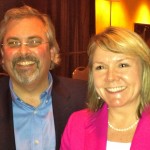Three years ago, I published a blog titled Too Busy? I was reminded of this as I got the notice from SOREDI that Slammed: Succeeding in a World of Too Busy author and friend Randy Harrington was the featured speaker at the upcoming 2018 Southern Oregon Business Conference. The blog still rings true, and I am delighted to revisit it along with Randy’s fantastic book.
Here’s what I wrote in 2014:
How did you answer the last time someone asked, “How are you?” I’ll bet it was something like:
- Oh, I’m slammed!
- I’m so busy!
- Crazed!
- Buried!
Recently a colleague told me she was “doing a trapeze act until the monster project is finished.” The week before, she was “wrapping up a gargantuan project.” Sounds impressive, but what does that even mean?
It seems that people have confused their own busyness with importance, value or worth. If I’m this busy, I must be in demand. I must have a thriving business. I must be very successful.
Think about the perception that your busyness creates for others. Have you created a personal brand as a very, very busy person? What does this mean? When I think “busy,” I think harried, rushing, frantic—and probably not necessarily effective or of great quality. More Tasmanian Devil and less effective leader or loving family member.
The sad thing is this perception of busyness is harming how we connect and how we interact with one another—both with colleagues and with family and friends. We forget to make time for important things like mentoring a new professional (they wouldn’t dream of asking for help from such a busy person). Or we may miss an invitation to a niece’s piano recital or basketball game because everyone knows “Aunt Chrissy is too busy.”
We have a choice in how we perceive and how we show up in the world.
I have chosen NOT to be busy busy busy. I prefer to think of myself as happily making my way toward my personal and professional goals. I take time for things that need time. I savor. I enjoy every moment that I can. I am grateful.
While I may have as many time challenges as the next person, I choose to represent myself (and think of myself) as a happy person who is in control of my life and not being run ragged by myriad demands and pressures. Ask me how I am, and chances are I’ll answer, “I’m great.”
Slammed
In Slammed: Succeeding in a World of Too Busy, Randy and coauthor Carmen E. Voillequé provide solid advice on reframing your “slammed-ness.” Below is an excerpt from the book.
We have to start thinking about where we are today and at the same time where we want to be tomorrow. If we can fence off the triage work in our minds for a moment, what does that give us permission to dream of for a new future? This act should be fun. It should feel like a breath of fresh air. It should be motivational.
Here’s a short list to get you started:
- Schedule exercise, meal prep time, yoga using your Outlook or smart phone calendar right alongside your meetings and conference calls, and try color-coding them to stand out. This will elevate health to the same level of importance of “worky-work.”
- Stop competing with other people for who has the most stress; just stop having those conversations. It really is that simple (ok, yes, but not easy!). And when people do complain about too much stress from being Slammed, make it an all stop moment where a solution will have to be found.
- Encourage and learn from others who seem to have figured out how to align time to their values and not the other way around. Rather than feeling a sense of judgment or jealousy, ask them to be your mentor in learning to avoid the trap of task saturation.
- Explore your artistic side. Any kind. Anywhere. It doesn’t have to be the next Picasso—even a quick doodle on your meeting agenda can be a source of inspiration! Art helps everything. Go see it. Make it. Read it. Doesn’t matter. Feed that part of your soul regularly.
- Include all development work as an accomplishment/goal in your professional growth. Don’t shy away from the fact that you are committing to be more healthy, happy, engaged and productive.
Most importantly, the way we talk about being busy has to change. “I am Slammed” is no longer in your vocabulary!
It’s time to change your vocabulary and how you approach your situation. Start with a positive mindset. As happiness guru Shawn Achor likes to point out, people get happiness backwards. Getting that monster project done will not make you happy—but your being happy will get that project done faster and better. It’s called the happiness advantage, and you can get it!
If you are looking to change how you approach your situation and be more positive, you are in luck. Research shows that we can rewire our brains at any point in our life. It comes with intention and practice, and it is absolutely doable. Let me know if you would like a free coaching session to get started.



 That’s what today’s strategic plans need to be, according to
That’s what today’s strategic plans need to be, according to 



